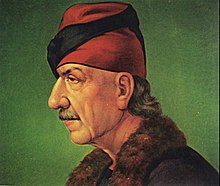| Lazaros Kountouriotis Λάζαρος Κουντουριώτης | |
|---|---|
 Lazaros Kountouriotis Lazaros Kountouriotis | |
| Senator | |
| In office ? – 12 June 1852 | |
| Monarch | Otto |
| Prime Minister | Antonios Kriezis |
| Personal details | |
| Born | April 1769 Hydra, Ottoman Empire (now Greece) |
| Died | 12 June 1852(1852-06-12) (aged 83) |
| Relations | Georgios Kountouriotis (brother) Pavlos Kountouriotis (great-nephew) Pantelis Horn (great-grandson) Nikolaos Votsis (great-great-nephew) Dimitris Horn (great-great-grandson) |
| Awards | |
| Military service | |
| Allegiance | |
| Branch/service | |
| Battles/wars | Greek War of Independence |
Lazaros Kountouriotis (Greek: Λάζαρος Κουντουριώτης; April 1769 - 6 July (O.S.) or 12 June 1852) was a Greek Senator of the 1844 Senate and a major figure of the Greek War of Independence.
Life
Lazaros Kountouriotis was born in Hydra in April 1769 to an Arvanite family. The family, apparently the richest in independent Greece, stemmed from the younger son of an Albanian peasant. He settled the island as a boatman after the Venetians left the Peloponnese (1715) but before the island received its permanent colony. The Koundouriotis family used extensively their native Arvanitic dialect of Hydra. After the family moved to Hydra, they adopted the surname "Zervas" which was later dropped when Lazaros' grandfather, Hatzigeorgios Zervas, visited a family friend in the Kountouria region and returned wearing a local to that area dress, adopting the nickname of "Kountouriotis" which eventually replaced the surname. Lazaros' father, Andreas, used the new surname of Kountouriotis and married the daughter of the very influential and rich merchant Lazaros Kokkinis. Lazaros Kountouriotis was the eldest of two children, his younger brother by 13 years was Georgios.
At the age of 14, Lazaros became involved in the commercial activities of his father, representing him in Hydra while the elder Kountouriotis was on business in Genoa. After his father's assassination in 1799, Lazaros continued running the family's interests and grew it substantially.
Although he was not one of the initial instigators of the revolution, which he considered premature, he supported it fully after it began. At the time, his fortune was estimated to be at least 800,000 reals and he spent 3/4s of it for the revolution.
While serving as a Senator and considered as the First Citizen of Greece, he died on 12 June 1852 and a five-day period of national mourning followed.
The playwright Pantelis Horn was Lazaros' great-grandson.
Sources and references
- Αγαπητός Σ. Αγαπητός (1877). Οι Ένδοξοι Έλληνες του 1821, ή Οι Πρωταγωνισταί της Ελλάδος (in Greek). Τυπογραφείον Α. Σ. Αγαπητού, Εν Πάτραις. pp. 101–114.
- "Registry of Parliamentarians 1822-1935" (PDF). Official website of the Hellenic Parliament (in Greek). 16 March 2013. p. 62
- Peter Trudgill Sociolinguistic variation and change, Published by Edinburgh University Press, 2002, ISBN 978-0-7486-1515-5
- Petropulos, J.A. (2015). Politics and Statecraft in the Kingdom of Greece, 1833-1843. Princeton University Press. p. 70.
- Jochalas, Titos (2020). "Lettere di contenuto velenoso inviate da Londra al Primo Ministro greco scritte nel dialetto albanese di Idra (1824)". Shejzat. 3–4: 69.
The two letters published here are written in the Albanian dialect of Hydra in London (20 Sept. and 16 Mar. 1824) by Hydriot Ioannis Orlandos, and sent to another Hydriot Gheorgios Cunduriotis, his father-in-law as well as Prime Minister of the Greek Government. In an attempt to get rid of Zaimis who currently was in London, Orlandos sent this bitter letter whose content should not be disclosed to Cunduriotis. In fact, he wrote in the Arvanit language of Hydra, a language that the recipient undoubtedly understood. In his second letter, Orlandos overstepped every mark of courtesy displaying insolence and maliciousness. He did not deem sufficient to simply write una letterra di raccomandazione imbued with venom and bitterness on behalf of youngster Stavros Parthenopulos but he also had the courage to hand it over personally to the young man in order to personally deliver it then to Gheorgios Cunduriotis, Prime Minister of the country. In case Parthenopulos would open and read the letter, Orlandos wrote the section relating to the deliverer in the Arvanit language of Hydra, so as to avoid any personal involvement in the question. The text in Albanian in both letters is written in the Greek alphabet and reverberates the peculiar Albanian dialect of Hydra otherwise known as Arvanitica.